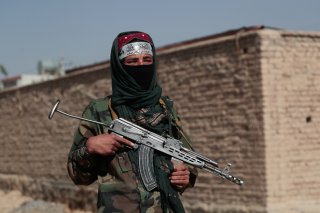Trevor Filseth L

The Islamic State’s Khorasan Province, or ISIS-K, has engaged in a campaign of terror against ethno-religious minorities within Afghanistan, according to a new report by Human Rights Watch—which faulted the country’s ruling Taliban movement with failing to live up to its promise to ensure security throughout the country.
ISIS-K has “repeatedly attacked Hazaras and other religious minorities [within Afghanistan] at their mosques, schools, and workplaces,” the report read. It noted that the Taliban had “done little to protect these communities from suicide bombing and other unlawful attacks or to provide necessary medical care and other assistance to victims and their families.”
Taliban leaders have repeatedly claimed since the group’s conquest of Afghanistan in August that they had brought security to the country. However, throughout the Taliban’s time in power, ISIS-K has grown in strength, launching attacks against religious minorities, including Hazaras, Sufis, and Sikhs, at an increasing rate. So far, the group has claimed responsibility for thirteen attacks and has been linked to three others, causing at least 700 casualties among Afghan civilians. The report observed that this number was likely an underestimate, as the Taliban’s strict media reporting requirements ensured that some other attacks were likely not covered in the country’s press.
As part of its report, HRW interviewed twenty-one survivors of ISIS-K attacks and their family members from the cities of Kabul and Mazar-i-Sharif between April and July. The report noted that the victims' families would struggle to provide for themselves without a breadwinner, in addition to the immediate damage from the attacks. Women, in particular, faced further restrictions, as the loss of their male relatives would restrict their ability to work or participate in public life.
Fereshta Abbasi, an Afghanistan researcher at HRW, emphasized that the group had “an obligation to protect at-risk communities and assist the victims of attacks and their families.”
The report also speculated that some attacks against minority groups might have occurred with the tacit support of elements within the Taliban. The group pledged to protect the Hazaras and other ethnic minorities in August but openly persecuted them during the group’s initial period of rule from 1996 until 2001 and opposed them for much of its twenty-year insurgency.
“Taliban officials who fail to take action to protect religious minorities from attack may be complicit in these grave crimes,” the report read.
No comments:
Post a Comment